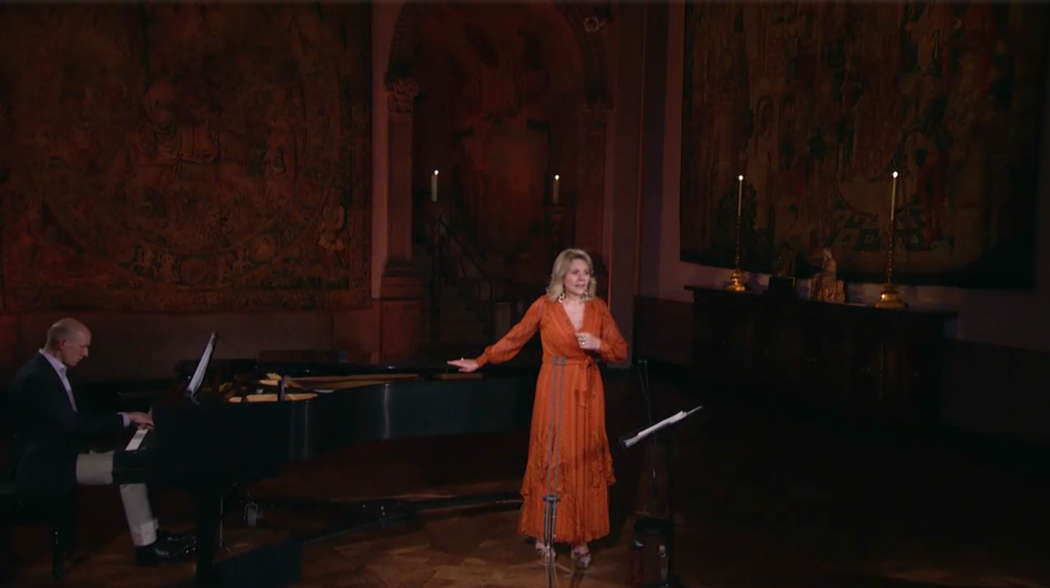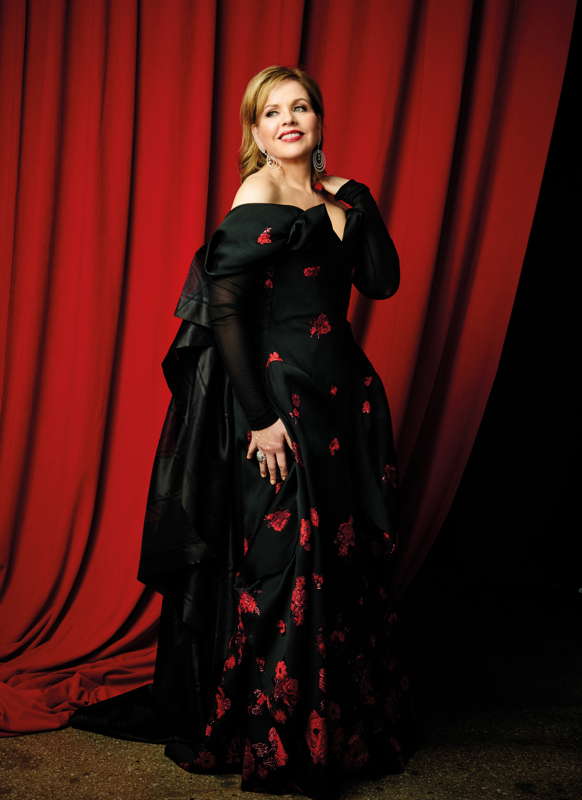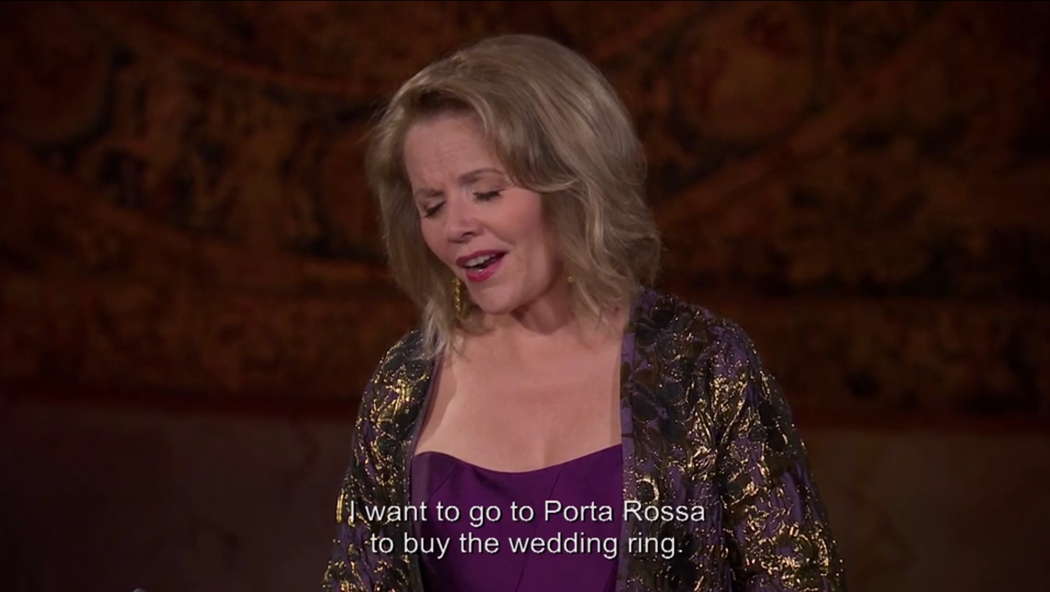ARTICLES BEING VIEWED NOW:
- Régine Crespin
- Hector Berlioz
- Ruth Railton
- Marián Varga
- Profile. A Very Positive Conductor - Paul Bodine talks to Los Angeles Opera's Music Director Designate, Domingo Hindoyan
A Soothing Balm on our Troubled Time
MARIA NOCKIN connects to Renée Fleming and Robert Ainsley's Metropolitan Opera recital from the Dumbarton Oaks Museum music salon in Washington DC
At 13:00 EDT on 1 August 2020, soprano Renée Fleming and pianist Robert Ainsley gave a delightful recital in the intimate music salon of the Dumbarton Oaks Museum in Washington DC. For those who did not see this performance, streaming is available through 12 August from the Met for US$20. Only Fleming, Ainsley and two camera persons were in the salon. Two other cameras were robots.

Renée Fleming and Robert Ainsley in rehearsal for their Met Stars Live in Concert recital in Washington DC. Photo © 2020 New York Metropolitan Opera
Wearing a long, ruffled plum-and-black silk gown under a cloth-of-gold coat, Fleming was queen of all she surveyed in the warm ambiance of the tapestry-lined Music Room. She opened with John Corigliano and Kitty O'Meara's unaccompanied song As the People Stayed Home. Her voice full and steady, I wondered why she is retiring from opera. Her high notes were smooth and solid as she told of today's unusual social mores, staying away from other human beings. As she sang of healing, her high notes became a soothing balm on our troubled time.
She decorated her second offering, 'Endless pleasure, endless love' from Handel's Semele, tastefully with ornaments of the time. In its text, the singer asks to be conveyed to a peaceful shore, a desire similar to the hope of our time cited by O'Meara in the text of the first song. After the two songs, Fleming spoke of this similarity occurring despite the hundreds of years between the times of these compositions. Truly, the basic tenets of human nature do not change. For a lighter mood, in Dalila's aria from Act II of Handel's Samson, Fleming and Ainsley showed us the value of grace notes and a snappy rhythm for lifting spirits.
A film clip gave the singer and her accompanist a bit of a break. The audience watched pictures of Fleming's childhood, her young adult years, her time in the Met's Lindemann Young Artist Development Program and the beginning of her career with the company. Short excerpts from La traviata, Der Rosenkavalier and other operas gave a retrospective of her early career but conveyed only a few musical and interpretive ideas. I think an artist's work is better represented with fewer but longer film excerpts, such as those shown at Jonas Kauffman's recital.

Renée Fleming. Photo © 2019 Andrew Eccles/Decca
Fleming and Ainsley returned live with a Hahn song and a bit of an internet reboot. Then the diva sang Joseph Canteloube's song of a shepherd in the Auvergne, 'Baïlèro', that culminated in a charming piano finale. Fleming continued with a piece that marks her interpretation of Massenet's Manon, 'Adieu, notre petite table'. Some Manons are all party girl. Fleming's is not, and her character has trouble making up her mind to leave Des Grieux. Thus, her tears as she leaves their table-for-two.
Then it was back to film and a longer and meatier excerpt, the finale from Tchaikovsky's Eugene Onegin starring Fleming and charismatic Siberian baritone Dmitri Hvorostovsky. As she told him she would never run away with him, her diminuendo from forte to fil-di-voce was exquisite.
The live recital continued with an aria from Korngold's Die Kathrin, 'Ich soll ihn niemals' (I can never see him again). It was a wonderfully melodic song, slightly reminiscent of 'Marietta's Lied' from Die tote Stadt. Fleming spoke of her love for the music of Richard Strauss and gave some excellent background before singing a heart-string-pulling portion of the Marschallin's monolog.
The final film portion showed Fleming's career with mini-excerpts from Thais, Rodelinda, Der Rosenkavalier, Armida, Otello, The Merry Widow, Capriccio, Rusalka and Eugene Onegin. I wish they had shown more of Thais because so few people have had the chance to see it.
Returning to the live recital, Fleming treated her audience to a fascinating aria from Leoncavallo's La bohème and another excerpt from Der Rosenkavalier, followed by an aria that, until the Met's recent production, we associated with aging singers, 'Io son l'umile ancella' from Cilea's Adriana Lecouvreur.
'O mio babbino caro' (O dear Daddy) from Puccini's Gianni Schicchi, is usually sung by beginners who don't perform it nearly as beautifully as Fleming did on this Washington afternoon.

Renée Fleming singing Puccini's 'O mio babbino caro' at the Dumbarton Oaks Museum music salon in Washington DC. Photo © 2020 New York Metropolitan Opera
Relating to the time and wishes of today's audience, Fleming sang Arlen's Over the Rainbow, lacing it with appealing jazz ornaments. To end on a soothing note of healing, she sang Brahms' beloved Lullaby, reminding us that another day will come.
Copyright © 3 August 2020
Maria Nockin,
Arizona USA

FURTHER NEW YORK METROPOLITAN OPERA REVIEWS




